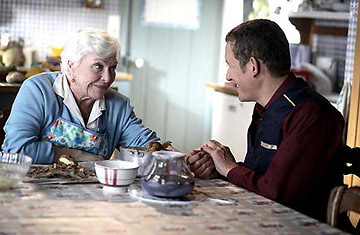
Bienvenue chez les Ch'tis
When Americans want an iconic image of poverty, joblessness, alcoholism, and despair, they look to trailer parks. The rough French equivalent is the Nord Pas de Calais department, a swath of hardscrabble land that makes up about a third of France's northern border. While the neighboring Belgians remain the favorite butt of French jokes about simpletons, France has traditionally considered its indigenous northerners, known as Ch'ti, too miserable to even joke about. Instead, the Ch'ti were the folks filmmakers habitually went to for dismal, Zola-esque images of France's post-industrial decline and squalor. But that glum picture has suddenly changed thanks to a new Ch'ti comedy that is setting box office records and turning northern France into the hottest, trendiest entertainment draw in French history.
The film Bienvenu chez les Ch'tis (Welcome to the Ch'tis) has sold more than 5 million tickets during its first week in the cinemas, shattering the previous roll-out box-office record of 3.9 million set in 2006 by Les Bronzés 3 — a comedy that similarly pokes fun at notorious French stereotypes. But whereas the Bronzés film was just the latest in a hugely popular series spanning back to the original 1978 film, Bienvenu chez les Ch'tis has been a bolt-from-the-blue phenomenon. Its simple, sex- and violence-free tale about normal, unappreciated people has many critics comparing it the 2001 French smash hit Le Fabuleux Destin d'Amélie Poulain (Amélie in the U.S.). In light of its strong first week, some French film experts expect les Ch'tis to break the record for a domestic film or even better the all-time 20.7 million viewers mark set by Titanic.
Even if it doesn't go that far, the small budget ($16.5 million) les Ch'tis has already produced the mini-miracle of enticing French moviegoers into laugh away some of their own enduring regional prejudices. The movie tells the tale of Philippe Abrams, a manager in France's postal system whose efforts to finagle a transfer to the sunny Riviera go wildly wrong. His bosses punish him by sending him instead to the Nord Pas de Calais, warning him of its reputed cold, gloom, incessant rain, and expanses of flat, barren land pocked by slag heaps, abandoned mines, and derelict factories. Just as dismal, he is told, are the region's residents: beer-guzzling, perpetually-unemployed louts who never saw anything deep-fried they didn't love; who pack large, allegedly inbred families into dilapidated brick row houses; and whose "Ch'timi" patois — rooted the ancient French Picard dialect — is incomprehensible to outsiders. Little wonder Abrams decides to spare his wife the horror of the north by moving up alone — arriving in mid-summer in a polar jacket and after-ski boots.
At first, Abrams gets much of what he dreaded. The region greets him with a driving deluge the minute his car crosses into it, provoking an accident with Antoine Bailleul, one of the postal workers he'll be managing. It takes a disoriented Abrams awhile to realize Bailleul's Ch'ti speech isn't the result of a broken jaw — and even longer to acclimate himself to some of the area's unusual customs (such as breakfasting on toast smeared with pungent Maroilles cheese dunked into chicory-cut coffee). But soon Abram identifies the charms behind the quirky habits and speech, and finds himself forced to hide his contentment with the place and its people from his wife — whose anti-Ch'ti bigotry inspires loving appreciation for her husband's self-sacrifice in enduring a solitary life in White Trash Central.
The unapologetically feel-good movie is the work of stand-up comic and native Ch'ti Danny Boon, who plays the role of Bailleul. Boon has made no secret that his motive was to dismantle and mock French prejudices about the north and its inhabitants. As the box office figures show, French cinema lovers are lapping that effort up. But there's more at work than simple entertainment. "This movie is doing what [author Marcel] Pagnol did for the Provençals: showing that people broadly considered buffoonish and stupid are actually very interesting, alluring, and deeply human," says Patrice Languetif, a Paris jeweler who spends much of his free time in his home in Ch'ti-land. "I've never seen Ch'tis prouder since this movie came out. I'm also getting requests from Paris friends who never showed any interest in the north before to go up there with me on weekends. The film has given a lot of relief to a map of the north that most of France had written off as dismally flat."
